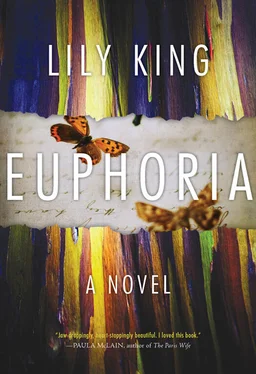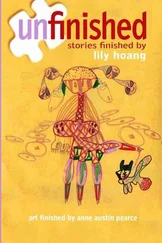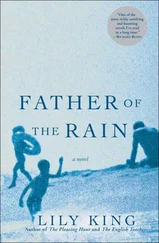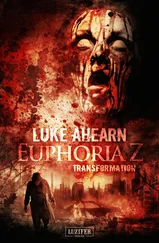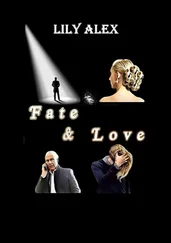As we were stumbling back up the path from the beach, one of us said, ‘Could it work for individuals?’
And we raced the rest of the way back, scrambled to make another grid. I still have that old page, wrinkled from the lake water that dripped from our hair.

It was easy to slot people in. We started with famous strong personalities: dreamy, spritelike Nijinsky in the East and the punishing, cane-carrying Diaghilev in the West; Hoover in the North and Edna St. Vincent Millay in the South. We added colleagues, friends, relatives. While Fen and Nell were arguing about whether someone named Leonie was Northeastern or just Eastern, I put Martin beside Helen in the East, and John next to Nell’s mother at Northwest. But Nell caught me.
‘And your mother?’ she said.
‘Northern to the bone.’
She laughed, as if she has suspected as much.
‘What are we then? Fen said. ‘We have to put ourselves on here.’
‘You’re Northern, I’m Southern and Bankson’s Southern.’
‘Oh, that’s cozy,’ Fen said.
‘Should I feel insulted?’ I said quickly, hoping to diffuse it.
‘Hardly,’ he said, pointing to the South. ‘To be Southern is to be perfect in Nell’s mind. Look who’s there with you: Boas, her grandmother, and her baby sister who died before ever speaking a word.’
‘Stop it, Fen.’
‘Sorry I’m not a sensitive little prat who can pick up on your every thought and tend to every nick and bug bite.’
‘This is not about us, Fen.’
‘The hell it isn’t.’
‘Let’s just stick to—’ Nell said, but a frantic crunch and rustle through the thatch above us drowned her out. Rats fleeing something.
‘Snake,’ Fen said.
It slipped fast down a post and was gone.
‘I hate snakes,’ I said. In fact my stomach had soured just from the sound of it.
‘So do I,’ she said.
‘Bloody Southern cowards,” Fen said.
And we were all right for a while after that.
We kept at it. The sun came up and went down again. We believed we were in the throes of a big theory. We could see our grid in chalk on university blackboards. It felt like we were putting a messy disorganized unlabeled world in order. It felt like decoding. It felt like liberation. Nell and I spoke of never having felt aligned with our culture, with its values and expectations. For long stretches of time it felt like we were crawling around in each other’s brain. We talked in the abstract about relationships, which temperaments went well together. Nell said opposites worked best, and I hastened to agree, though I didn’t believe it, and hoped she didn’t either. She said that Southerners were less possessive with their lovers, more inclined to polygamy.
‘It’s what her set calls free love,’ Fen said. ‘Multiple partners. You go in for that too, Bankson?’
‘No.’ It was the only answer I could give him under the circumstances.
‘Well then, a possessive Southerner for you,’ he said to Nell.
Later, when Fen went to the shit house, as he called it, she said, ‘Do you think it’s natural, the desire to possess another person?’
‘Natural? Weren’t you the one to warn me off that word?’ When Fen was there I was able to contain my attraction to her, but whenever he left I felt it fill the room.
She smiled, but she was serious. ‘Instinctive then, biological? Why are there so many tribes who share everything — food, shelter, land, income — but their stories always revolve around someone’s brother or best friend stealing his woman?’
‘It’s true. The Kiona’s creation myth is about a crocodile who falls in love with his brother’s wife and they run off together to create a new tribe.’
‘Have you ever felt that, the impulse to possess someone?’
‘Yes.’ But I could hardly tell her how recently. ‘Perhaps I’m not so Southern after all.’ Then, to deflect her, I told her about Sophie Soules, a French girl I was engaged to briefly the summer after Martin died, and that when I broke it off, her father had me write a letter attesting to her virginity.
‘A letter promising you had not possessed her. Was it the truth?’
She was a nosy parker. ‘Of course,’ I paused, ‘it was not true.’
She laughed. ‘Was she wine or bread to you?’
‘What do you mean?’
‘It’s from an Amy Lowell poem we all loved in college. Wine is sort of thrilling and sensual, and bread is familiar and essential.’
‘Wine, I suppose.’
‘Would it have turned to bread?’
‘I don’t know.’
‘It doesn’t always.’
‘No, I suppose not.’
She rolled a pencil beneath her palm on the table and then she looked up at me. ‘Helen and I were lovers,’ she said.
‘Ah.’ This explained a few things.
She laughed at my ‘ah’ and told me they had met during Nell’s first anthropology class with Boas. Helen, a decade older, was his graduate assistant. Their connection was instant and though Helen was married with a house in White Plains, she stayed in the city many nights a week. She had encouraged Nell to go and study the Kirakira, but wrote her angry letters accusing Nell of abandoning her. Then she surprised her by meeting the boat in Marseille with the news that she had left her husband.
‘But you had met Fen.’
‘I had met Fen. And it was awful. Before Helen, I would have said that the desire to possess others is more male than female in our culture, but I think temperament comes into it.’ She tapped the pencil on our Grid.
‘Was she bread to you?’
She shook her head slowly. ‘People are always wine to me, never bread.’
‘Maybe that’s why you don’t want to possess them.’
Fen didn’t come back for over an hour, and when he did his face was ruddy and bright, as if he’d been out in the cold. Neither of us asked him where he’d been. We continued to work on the Grid until Fen looked up and said, ‘I wonder what the baby will be.’
‘Fen.’
‘What baby?’ I said.
‘Our baby,’ he said. He leaned back, deeply satisfied by my shock.
It all felt very unpleasant to me and I couldn’t look at either of them, nor think of a single word to say.
‘You haven’t told him then, Nellie? Didn’t want him to fuss about?’
Is that how she saw me, as someone who fretted over her unnecessarily? Is that what a ‘Southern’ man signified to her? Finally I eked out some sort of congratulations, said, ‘Excuse me,’ and got out of the house.
I walked down the men’s road. A cluster of pigs were muscling each other for a scrap of food beneath one of the houses and making a racket. There was very little light in the sky, but whether it was sunrise or dusk, I wasn’t sure anymore. I had been spun around by them. I was seven hours away from my work, and had been for who knew how many days. Nell was pregnant. She and Fen had made a baby. When I was with them it was easy to convince myself that she hadn’t fully made her choice yet. She played her part in that. Her eyes burned into mine when I had an idea she liked. She followed every word I said; she referred back. When I had written down Martin’s name on the graph she’d passed her finger over the letters. I felt in some ways we’d had some sort of sex, sex of the mind, sex of ideas, sex of words, hundreds and thousands of words, while Fen slept or shat or disappeared. But his kind of sex with her produced a baby. Mine was useless.
Where the houses ended the road broke in three directions: straight to the next hamlet, left toward the water, and right to the women’s road. At this intersection up ahead, I saw two shapes against the trees, a man and a woman. They were not touching. If I hadn’t known better I would have said the man was white, not because of his skin color, which I could not see in the nearly complete darkness, but in the way he stood sloped and heavy with his weight out in front. As I got closer I could hear they were arguing, the girl in a pleading tone, and when the man saw me he started toward me, then stopped short. He turned back and said something to the girl and they moved on quickly up the women’s road. Xambun. It had been Xambun. And for those few steps he’d taken toward me, he’d thought I was Fen.
Читать дальше
